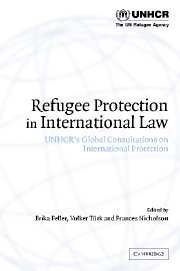Book contents
- Frontmatter
- Contents
- List of annexes
- Notes on contributors and editors
- Foreword
- Preface
- Acknowledgments
- Expert roundtables and topics under the ‘second track’ of the Global Consultations
- Table of cases
- Table of treaties and other international instruments
- List of abbreviations
- Part 1 Introduction
- Part 2 Non-refoulement (Article 33 of the 1951 Convention)
- Part 3 Illegal entry (Article 31)
- Part 4 Membership of a particular social group (Article 1A(2))
- 4.1 Protected characteristics and social perceptions: an analysis of the meaning of ‘membership of a particular social group’
- 4.2 Summary Conclusions: membership of a particular social group, expert roundtable, San Remo, September 2001
- 4.3 List of participants
- Part 5 Gender-related persecution (Article 1A(2))
- Part 6 Internal protection/relocation/flight alternative
- Part 7 Exclusion (Article 1F)
- Part 8 Cessation (Article 1C)
- Part 9 Family unity (Final Act, 1951 UN Conference)
- Part 10 Supervisory responsibility (Article 35)
- Index
4.1 - Protected characteristics and social perceptions: an analysis of the meaning of ‘membership of a particular social group’
Published online by Cambridge University Press: 28 August 2009
- Frontmatter
- Contents
- List of annexes
- Notes on contributors and editors
- Foreword
- Preface
- Acknowledgments
- Expert roundtables and topics under the ‘second track’ of the Global Consultations
- Table of cases
- Table of treaties and other international instruments
- List of abbreviations
- Part 1 Introduction
- Part 2 Non-refoulement (Article 33 of the 1951 Convention)
- Part 3 Illegal entry (Article 31)
- Part 4 Membership of a particular social group (Article 1A(2))
- 4.1 Protected characteristics and social perceptions: an analysis of the meaning of ‘membership of a particular social group’
- 4.2 Summary Conclusions: membership of a particular social group, expert roundtable, San Remo, September 2001
- 4.3 List of participants
- Part 5 Gender-related persecution (Article 1A(2))
- Part 6 Internal protection/relocation/flight alternative
- Part 7 Exclusion (Article 1F)
- Part 8 Cessation (Article 1C)
- Part 9 Family unity (Final Act, 1951 UN Conference)
- Part 10 Supervisory responsibility (Article 35)
- Index
Summary
Introduction
In recent years, the number and variety of refugee claims based on the ‘membership of a particular social group’ ground set out in the 1951 Convention Relating to the Status of Refugees have increased dramatically. The social group cases have been pushing the boundaries of refugee law, raising issues such as domestic abuse, homosexuality, coercive family planning policies, female genital mutilation (FGM), and discrimination against the disabled.
Invocation of the particular social group ground is not surprising. Its potential breadth makes it a plausible vehicle for refugee claims that do not easily fall under the other grounds set out in Article 1A(2) of the 1951 Convention. This reads:
… [T]he term ‘refugee’ shall apply to any person who … owing to well-founded fear of being persecuted for reasons of race, religion, nationality, membership of a particular social group or political opinion, is outside the country of his nationality and is unable or, owing to such fear, is unwilling to avail himself of the protection of that country …
Furthermore, since the usual materials consulted in the interpretation of international agreements provide little assistance on the question of membership of a particular social group, adjudicators have adopted a range of (often conflicting) constructions of the Convention language. Courts and administrative agencies have at times announced a standard that adequately resolves the case before them only later to conclude that the rule must be modified because of subsequent claims.
- Type
- Chapter
- Information
- Refugee Protection in International LawUNHCR's Global Consultations on International Protection, pp. 263 - 311Publisher: Cambridge University PressPrint publication year: 2003
- 8
- Cited by



